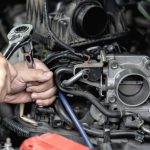Your car’s engine may be misfiring for many reasons. Generally, the misfire is the outcome of unfinished combustion located in one or more of the engine’s cylinders. You will most likely feel the car shake or feel as if the vehicle is hesitating. In newer cars, the check engine light will come on. If you have had this issue before, stay tuned for the most common misfires at idle and low RPM.
Why Would a Car Misfire in the First Place?
Are your friends embarrassed to be seen riding in your car? Are you tired of strangers laughing when you roll up to the stoplight? Is your vehicle unable to keep a continuous speed? Does the road always seem bumpy, even though the pavement is smooth as silk?
If you answered yes to any or all of these questions, you most likely have a misfire in your car. We feel your pain, and know how hard it can be to drive a noisy or rough feeling vehicle. There is no better time than now to fix it.
A car is idle when it has power going to the engine, providing all components to work without the ability to move. At this time, the engine should have a fluid sound and feel.
A host of reasons can be the cause of a car misfire. The sensor in the engine could cause the misfire, but this is not the only reason.
It is crucial for you to have it checked out as it could cause bigger issues in the future. The longer you wait to fix the issue, the larger the problem will become.
My friend had a misfire last year and was advised by another friend to have a mechanic look at it. He did not heed the advice. Later, he had costly repairs for his engine because he ultimately destroyed it.
Ignition System Problems
Various ignition system problems are an issue that could cause a misfire. Contrary to popular belief, the spark plugs are not the only reason there could be a misfire. Other factors that come into play include the control module, coil packs, wiring, and the crankshaft position sensor.
Engine Mechanical Problems
The piston located in every cylinder of a car’s engine will compress the air and fuel mixture for total combustion. As the piston is moved up, the cylinder is supposed to remain sealed off to create the compression needed. If the cylinder does not seal correctly, compression is lost and the engine will misfire.
Vacuum Leaks
An engine that runs properly will maintain how much air is taken in. When there is a leak, known as a vacuum leak in the mechanic world, the air-to-fuel ratio is knocked out of whack. Extra air is passed into the system, thus creating a lean fuel scenario. The lean fuel may cause a misfire which could produce a rough idle.
Control Circuit Problems
Electrical circuits connect input and output devices, such as sensors. If these have issues, such as a loose wire, an engine misfire may take place.
Emissions Equipment Problems
Older vehicles have various emissions equipment that helps to decrease the amount of pollution a car releases into the air. The positive crank ventilation system is an example of such. If there are issues with the emissions equipment, you may face an alteration in the air and fuel mixture, thus creating a misfire.
Sensor and Module Problems
Sensors are used widely on newer models of vehicles. Any sensory or module can easily create a misfire as the PCM utilizes these to regulate power over crucial functions.
Air and Fuel Delivery Problems
Air and fuel are mixed together in the engine, which is then ignited by the spark plugs. This combustion allows the vehicle to move down the road. Should the air and fuel mixture be changed, it could cause a misfire.
Fuel Filter Problems
Your car can idle when your car’s fuel pump is blocked or becomes faulty. If the fuel tank’s gas does not reach the fuel injector because it is not working properly, the pump could become clogged up. This will surely cause your vehicle to sputter or stall as the engine is not receiving the gas it needs to get going.
The fuel filter is also a common issue in misfires. This component removes any debris in the fuel, which will make the car idle if it is clogged. To remedy this, have your fuel filter changed or cleaned regularly.
Faulty Engine Temperature Sensor
If the temperature sensor in a car fails, an incorrect mixture may be produced by the fuel injection system. A rough idle can easily be felt when this is the case.
What To Do in the Case of a Misfire at Idle
If you do have a misfire at idle or low RPM, be certain to make an appointment with your mechanic. A computer scan can be easily completed to determine what issue is causing this. He may also be able to tell what the cause is by the check engine light.
Even if the issue seems small, it could easily turn into a large problem. This is especially true if you are not car savvy. It is always better to be safe than sorry when it comes to your car.
In Conclusion
It is important to realize your car may misfire at idle and low RPM due to many reasons. If you are not able to recognize what the reason is, take your car to your mechanic as soon as possible to have it looked at.
Damage can easily be done to your car’s engine if you allow it to misfire too many times. Then, not only will you be left without a car, but your pocketbook will also be hurting.



